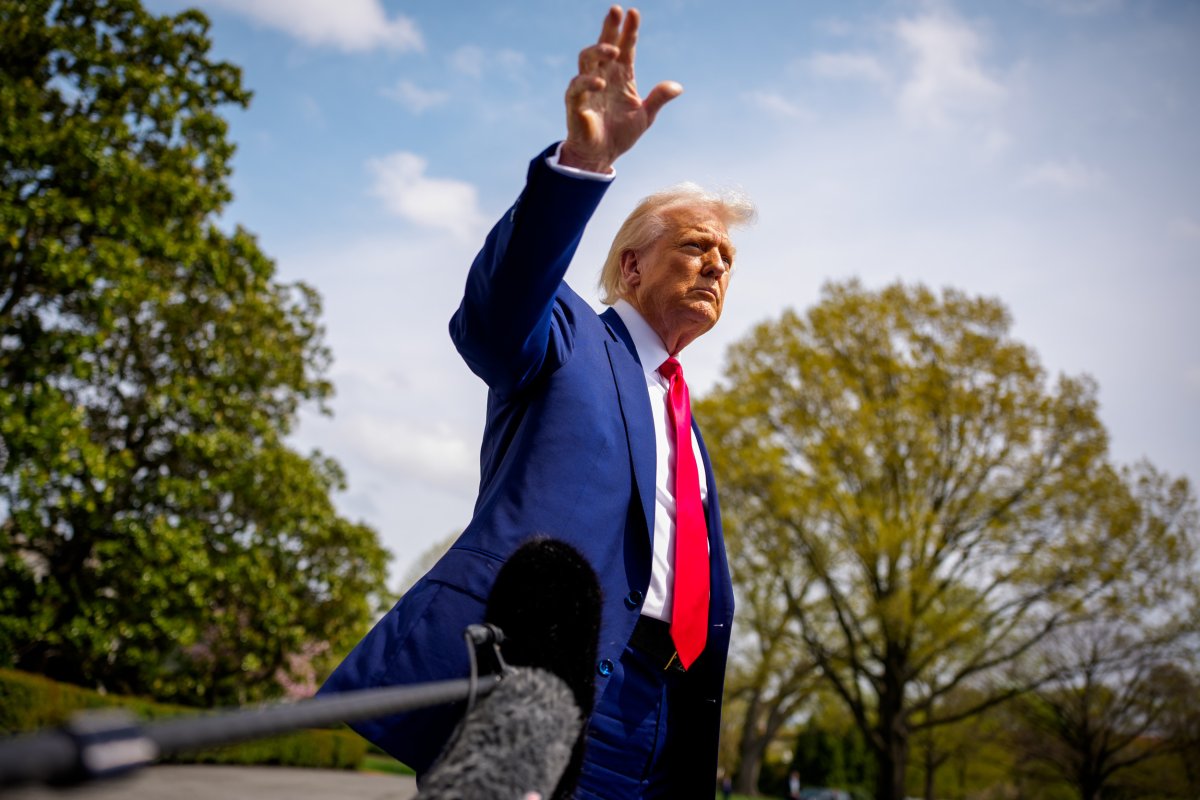Economists warn that President Donald Trump’s plan to implement tariffs on countless countries on the heels of his “Liberation Day” announcement pushes trading partners away and could continue stinging the stock market.
Mark Williams, master finance lecturer at Boston University’s Questrom School of Business, told Newsweek that if conditions persist, “the US could experience a recession as soon as June of this year.”
Why It Matters
Trump first launched his tariff threats against Canada, China and Mexico over claims of record amounts of fentanyl flooding into the country from the U.S. northern and southern borders. The Canadian government has repeatedly rebuked the president amid his ongoing remarks and threatened American imports as well.
In a news briefing on Wednesday, Trump announced a new host of tariffs on numerous trading partners in what he called “Liberation Day.”
What To Know
In his announcement, the president framed his tariff move as a “declaration of economic independence” for the United States.
China will see a new tariff of 34 percent, the European Union will see 2 percent, Japan will be hit with a 24 percent tariff and India will see 26 percent. Trump said these new surcharges are in response to current tariffs in place, which he calls “forms of cheating.”
He also bashed trading partners’ tariffs as “pathetic” and accused them of “ripping” the United States off.
When asked if Trump’s logic behind the decision was flawed, Williams told Newsweek via email on Thursday: “Trump’s policies are steep in ‘magical economic thinking’ and ignore 80 years of proven global trade practices. It is a fool’s errand to look unilaterally at tariffs, as if the US controls all the game pieces and trade is not globally interconnected. Trump is gambling that our largest trading partners will come to the table and negotiate terms that favor the US at their expense. In trade wars, countries protect their home turf and retaliate, this race to the bottom stokes inflation, slows economies, kill jobs and harms consumers.”
Williams added, “The stock market as a leading economic indicator has also voted on Trump’s tariff wars, plunging over 12 percent and erasing $4 trillion in wealth since the February 2025 market high.”
The S&P 500 opened Thursday morning 3 percent lower, as other indexes continue to experience losses.

Photo-illustration by Newsweek/Getty
When asked if Trump’s tariffs could lead to a recession, Williams added that “Tariffs should never be viewed in isolation, as such taxing can produce a ripple effect. The aggressive tariffs waged against our two largest trading partners, Mexico and Canada harm them but also have wider economic implications. About 80 percent of goods produced by Mexico and Canada are sold to the US. If prices are higher, their goods are less likely to be sold which could quickly push these countries into recession, triggering a wider and more painful global recession.”
Williams added, “The US is the largest buyer of goods globally. Given two-thirds of the US economy is driven by consumption, if American buyers are purchasing less goods, our economy could also [suffer]. The impact of inflationary tariffs has already started to appear in economic forecasts. Recently the Atlanta Fed revised its 2025 Q1 GDP estimates to -2.8 percent. Should this condition persist, and two consecutive quarters of negative GDP growth follows, the US could experience a recession as soon as June of this year.”
Cristian Tiu, chair and associate finance professor at the University at Buffalo, also told Newsweek via email Thursday, “In the best case scenario, we expect overseas businesses to move production to the US, and hire workers and invest in the American economy. But manufacturing in the US is more expensive – so higher prices, thus inflation.
“In the worst case scenario, prices go up (so still inflation), demand declines, other countries export less to the US, so they’ll have fewer dollars and probably buy fewer Treasuries [sic], so rates will go up even more, so maybe even more inflation. And with less demand (this less growth), that’s stagflation,” he continued.
Concluding, Tiu said, “In the middle, there will be probably an effort to ‘understand’ the tariffs (as today a finished product, like a car, is made with parts made in all kinds of [p]laces around the world, so it’s unclear what the price increase would be on it). Some of these tariffs will end up being revised, and we will move forward with caution, practically speaking.”
A handful of Senate Republicans on Wednesday also voted in favor of a measure that would effectively terminate the national emergency declaration used to green-light tariffs on Canadian imports. But the measure is likely to stall in the Republican-majority House.
Amid the backlash and uncertainty for consumers, Democratic Senator Chris Murphy suggested that Trump’s move is indicative of someone who wants to “stay in power forever.”
What People Are Saying
Mike Pence, Trump’s former vice president, posted to X, formerly Twitter, on Wednesday: “The Trump Tariff Tax is the largest peacetime tax hike in U.S. history. These Tariffs are nearly 10x the size of those imposed during the Trump-Pence Administration and will cost American families over $3,500 per year. Check Out ‘Spoiling America’s Golden Age’ @AmericanFreedom👇”
CNN’s Harry Enten posted to X on Thursday: “Americans on tariffs: ‘Oppose! oppose! oppose! No! No! No!… Americans want… nothing to do with it, yet Trump decides to keep pushing… [Could] end up ending his presidency.’ 56% overall oppose new tariffs. 72% overall & 64% of GOP (!) think they’ll raise prices short term!”
Trump, in a cryptic post to Truth Social on Thursday morning: “THE OPERATION IS OVER! THE PATIENT LIVED, AND IS HEALING. THE PROGNOSIS IS THAT THE PATIENT WILL BE FAR STRONGER, BIGGER, BETTER, AND MORE RESILIENT THAN EVER BEFORE. MAKE AMERICA GREAT AGAIN!!!”
What Happens Next
The new tariffs Trump announced go into effect on Saturday.



